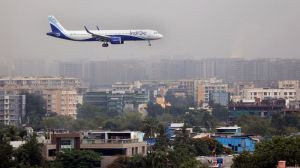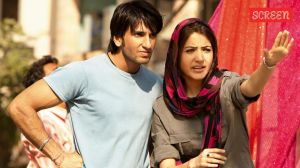Meet Negha S and Alina Khan, two trans actors, from India and Pakistan, who are changing the narrative
Seven decades since Independence, has Indian and Pakistani cinema and society become more accepting of the transgender community and are giving them real representation?
 Alina Khan (Photo Stephanie Cornfield) and Negha S
Alina Khan (Photo Stephanie Cornfield) and Negha S Among the things the new Tamil film Gargi gets right, besides Sai Pallavi, is casting a real-life trans person in the role of a trans judge (Sudha S), who, presiding over a rape case, rebuts a male advocate in a most dramatic yet necessary way: “What you think is abnormal is what I see as a balance. I know where it hurts a woman, I know where a man’s arrogance stems from… Both! I am the best person to decide the case.” This is a rare instance of the reel reflecting the real. There are, at least, three trans judges in India, one of whom has challenged the Transgender Persons (Protection of Rights) Bill, 2019.
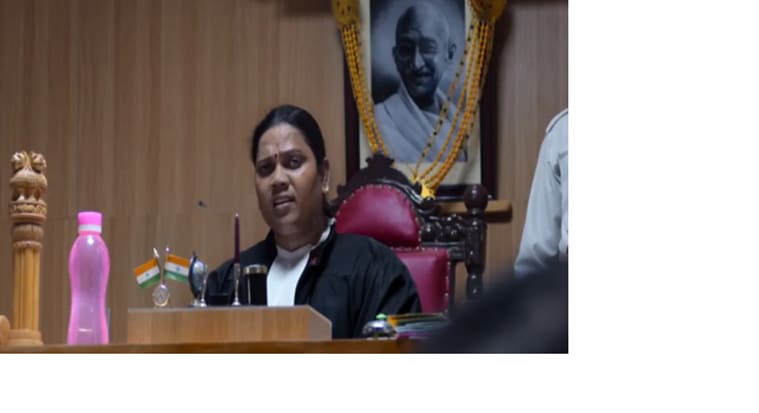 Sudha S plays a trans judge in the new Tamil film Gargi
Sudha S plays a trans judge in the new Tamil film Gargi
In the not-so-distant past, filmi depictions of trans characters, including in Bollywood and south India, have remained misrepresentative and triggering. “Why should cis-male actors play trans? They have the privilege to refuse taking up these roles and instead allow trans persons to play themselves on screen,” says Tamil actor Negha S. As Pakistan’s Alina Khan says, “You just can’t put a wig and a dress on a man and he becomes a trans, banawati nahin hai (you can’t fake being trans). It’s natural.”
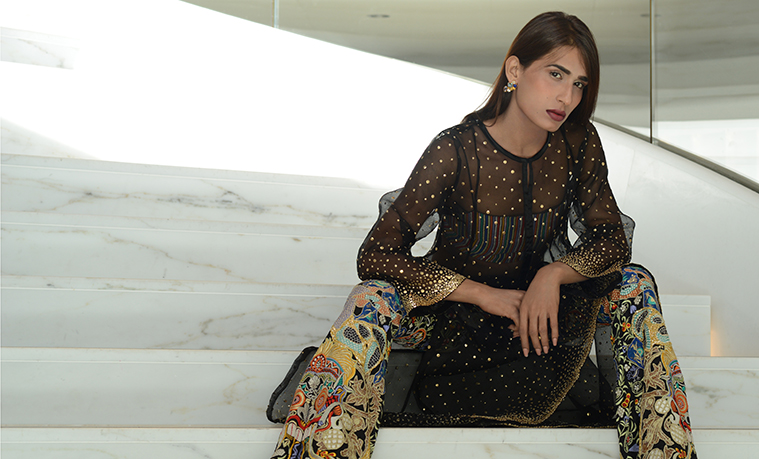 Alina Khan in Cannes in May. Photo: Stephanie Cornfield
Alina Khan in Cannes in May. Photo: Stephanie Cornfield
In its 75th year of Independence, is Indian and Pakistani cinema making the effort to be inclusive and diverse? Films like the Tamil-Malayalam independent film Antharam and Pakistan’s Joyland are the exception rather than the norm. Negha picked up the Best Actress Award in the state’s first-ever trans category at this year’s Kerala State Film Awards for P Abhijith’s Malayalam feature while Alina from Saim Sadiq’s Joyland is the flavour of the season. After making Pakistan’s debut and picking up two awards at the Cannes Film Festival, the film bagged the Best Film from the Subcontinent at the Indian Film Festival of Melbourne this week, and is headed to the Toronto International Film Festival next month.
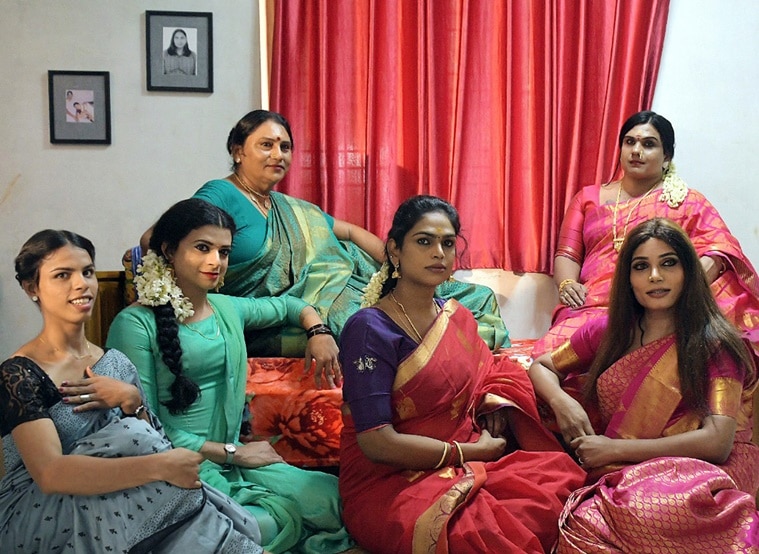 Trans writer-activist A Revathi (in green sari, at the back) and Negha S (in red sari, in front)
Trans writer-activist A Revathi (in green sari, at the back) and Negha S (in red sari, in front)
“Trans people are very prominent in Pakistan, for me, it’s as normal to put them in a film as to put a man or a female character, and right next to them, not more important, but not less either,” says director Sadiq about casting Alina in Joyland and his earlier Venice-awarded short film Darling (2019). The community’s photographs by director Abhijith, a photographer with Malayalam publication Madhyamam Weekly, had caught the attention of then-Kerala social justice minister MK Muneer in 2013. In 2015, Kerala became the first to bring in a trans Bill, “State Policy for Transgenders in Kerala”. “In our films, trans roles are played by cisgender men, some win state awards too, like Jayasurya. There are a lot of talented transwomen who didn’t get a chance to work in films. For instance, Tamil writer-activist A Revathi (who wrote Truth About Me: A Hijra Life Story, 2010, Penguin Random House) is the clan guru in my film,” says Abhijith, whose low-budget film hasn’t found a distributor yet. While both films, a cis-trans love story, reflect South Asian family culture, the character’s transness is more pronounced in the Indian film.
Buy Now | Our best subscription plan now has a special price
Growing up, Negha, hailing from a middle-class farmer family in Thiruvarur, near Thanjavur, and Lahore-based Alina went through similar ordeals at home. The most difficult of the battles are fought in the most intimate of spaces. While one has been eventually accepted, for the other, the doors remain shut.
 A still from Joyland
A still from Joyland
“Feelings shuru se thhi ki main mukhtalif hoon, auron se alag (from the start I felt I was different),” says Alina, as Negha adds, “I always had a feminine body language.” Parents would be strict, fathers and siblings would be disparaging. If Negha’s father put her in a dark room and beat her, triggering her suicidal thoughts — she, her thoughts weren’t valid, he’d tell — Alina’s mother took her to a maulvi, “dum karwane ke liye (to exorcise her).” When Negha’s father died this year, she wasn’t allowed to do the last rites. “My presence still brings a disgrace to the family,” says Negha, in fluent English, which she picked up from watching Netflix shows. She ran away from home at age 18, to Chennai. Alina had left home at 15, faced sexual harrasment from strangers, and returned home, but hid the fact from her family that she was pursuing dance.
If Negha was referred with derogatory slurs like “9” by others — number 9 is assigned to the community, in economic census forms, while 1 and 2 are reserved for men and women, respectively; the late DMK chief M Karunanidhi had challenged this in 2013 — Alina’s own brothers called her khusriya.
 Negha S
Negha S
Their all-male school teachers and classmates lacked sensitivity and awareness about gender-nonconforming children. Bullied, with boys touching their bodies, asking to show their “organ”, Negha’s biology teacher would even point at her as a product of what goes wrong when chromosomes XX and XY go haywire. It would affect their studies. Alina dropped out of school while Negha failed in math in her Class XII exams. Both awakened to the idea that there are others like them, to the system of trans clans with guru and chelas (mentor and disciples), once they crossed their home’s threshold. They also became aware of the humiliation at passport offices, airports, about the lack of affordable medical care, “Medical care for trans people is poor and very expensive in India, that’s why the community is forced to get into begging or sex work. I didn’t have to do either. I saved to have a proper surgery,” says Negha, who worked briefly as a tele-caller. Alina, too, survived by performing at private functions, even though male inappropriate behaviour was rampant there. Her clothes would be torn, she’d be forced to sit in strangers’ laps.
“We have to carry the burden of your stigma all our lives,” says Alina. Negha, who has slapped the NALSA judgement on the faces of many, says, “Transphobia, the hatefulness, bigotry is never going to change. They do it knowingly, in physical reality as well as in social media trolls.” “Cinema is no different,” she adds, “It is very transphobic. Star value is there, but directors think trans people can’t handle big roles. Besides, if you must, then show us as police, doctor, village person…not just as sex worker, beggars, comic or negative roles. Are these the only roles you can think of for us?” asks Negha, who sees her win as a win for their “movement, for every trans person who has died fighting gender discrimination” and sees herself as opening and holding the gate for future trans generations. She is next working in Trisha’s Tamil-Malayalam film The Road.
Alina has done the TV show Good Morning Zindgi, short film Happy Marriage, small TV commercials (Punjab Bank), Ali Sethi’s music video Chandni Raat. Her hard-earned money was treated as haram by her siblings. She was desperate for people to understand her. In 2018, she did a show — Punjabi mujra dance, mostly a space where women call the shots, to provide entertainment to men. “Only during breaks, can a transwoman take the stage, but there won’t be audiences to watch her” — at Naaz theatre, on Lahore’s Mall Road.
Both Negha and Alina worked at an NGO when film directors came looking for a trans artiste for their short films. Negha was cast in Manam, Alina got Saim’s short Darling (2019). Negha did five-six short films, two episodes of the Telugu web-series on Zee5 Police Diary. Both worked at NGOs when film directors came looking for trans artiste for their short films. Negha was cast in Manam, Alina got Darling. Neither had thought “acting could be a possibility”. “I performed on Pakistani Sufi Kalam. Sana Jafri (casting director) had come to watch. We exchanged numbers. At the same NGO, the auditions for Darling were held. They gave me training for dance, etc., but “mere dance mein lachak nahin aa rahi thhi (my dance lacked character). Five days prior to the shooting, they asked me to cut my hair short and to colour it. Now, my long hair, that I grew painstakingly, was my identity. But this was going to be a lifetime opportunity, so I did it. After Darling picked up three-four awards internationally, my brother called me up to say: I am seeing you everywhere, on YouTube, Instagram. You’ve worked in a film? What is your role in it? I shat in my pants,” says Alina.
 Alina Khan in a still from Saim Sadiq’s Darling
Alina Khan in a still from Saim Sadiq’s Darling
“I wasn’t allowed on the sets; the units would think I had come to beg. Later, I wasn’t offered tea, unlike the other straight actors,” says Negha, who was then working for the community’s welfare, crisis management, accessing social entitlements like Aadhaar, voter ID cards, sex awareness and education, accessing injections and health facilities, etc., “but that stressed me out. Now, I’m a full-time artiste, a VJ.” In Police Diary, she plays a gangster, “I need to survive, I can’t choose my characters. Though I would love to play neutral characters, like I have done in theatre,” says Negha, “People already consider us as villains, and with negative roles, we become super villains… I am dusky, not fair and beautiful. I had body issues and a scar on my forehead, but Abhijith gave me confidence, ‘come as you are’. Antharam is my first feature, in Tamil and Malayalam.” The film trains the lens on the aspect of how some straight men love transwomen, “keep it a secret, carry on having relations with them, while being married to cis-women and fostering children, mostly for their parents and society. “Many transwomen live adjusting to this secrecy. They are treated as a fetish and are abused. Society tells men that loving a transwoman is against nature. All men are cheaters. I was cheated upon and had a bad break-up with a cisgender man. The fact is that men can’t face strong individuals, whether women or transwomen.”
“Humesha trans community is shown in a bad light or ridiculed. In comedy shows, on TV drama, men ensured that we remain suppressed,” says Alina, “albatta, I have done good work. Biba (her Joyland character) and Alina are very different in personalities. Biba is stubborn, she doesn’t take a ‘No’ for an answer, neither does she pretend she carries her anger with her, but she’s very hard-working. I’m grateful to Saim ji for giving me the opportunity to be loved by my own family, which I never thought I’d live to see, and to have drawn Biba as an individual and through her the aspirations of a transwoman were shown.”
Pakistan passed its Trans Bill in 2018, allowing trans persons to self-identify their gender. This year, the Sindh government provided for 0.5 per cent job reservations to them. Alina says, badlaav (change) is happening but it’s too little, too slow.
- 01
- 02
- 03
- 04
- 05








